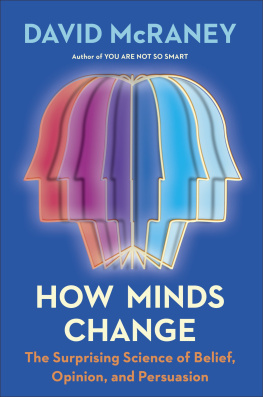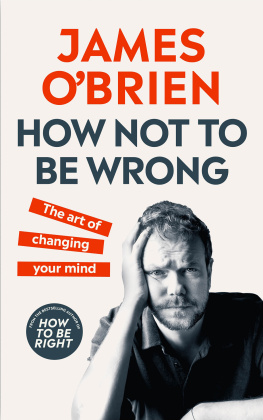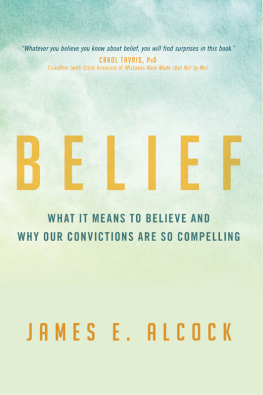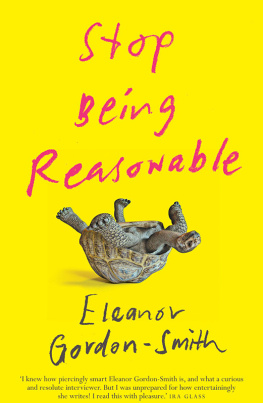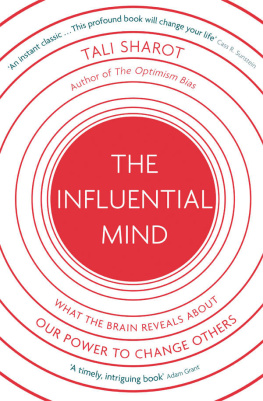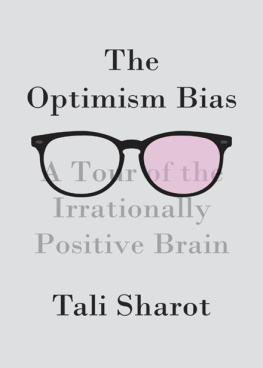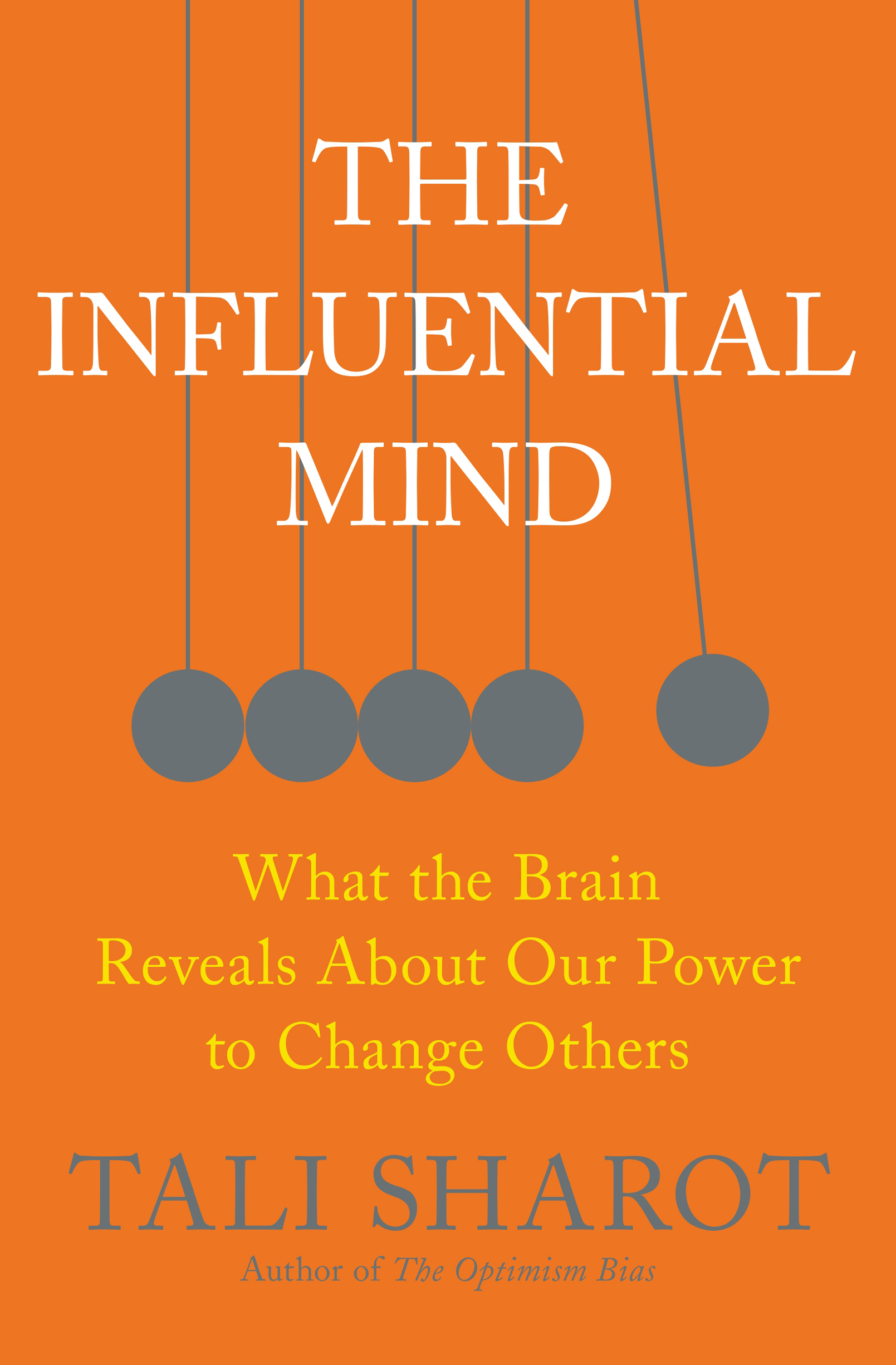Contents
Guide
Pagebreaks of the print version

The author and publisher have provided this e-book to you for your personal use only. You may not make this e-book publicly available in any way. Copyright infringement is against the law. If you believe the copy of this e-book you are reading infringes on the authors copyright, please notify the publisher at: us.macmillanusa.com/piracy.
For Josh
You and I share a role. Maybe you never stopped to consider this role, or perhaps you think about it all the time. If youre someones spouse, parent, or friend, you fulfill this role. If youre a doctor, teacher, financial adviser, journalist, manager, or human beingyou fulfill it.
This duty we all share is to affect others. We teach our children, guide our patients, advise our clients, help our friends, and inform our online followers. We do this because we each have unique experiences, knowledge, and skills that others may not. But how good are we at this role?
It seems to me that the people with the most important message, those who have the most useful advice, are not necessarily the ones who have the largest impact. Recent history is full of such puzzles, from the entrepreneur who convinced investors to pour billions into a shaky biotech endeavor to the politician who failed to convince citizens to fight for the future of their planet. What, then, determines whether you affect the way others think or whether you are ignored? And what determines whether others change what you believe in and how you behave?
The underlying assumption of this book is that your brain makes you who you are. Every thought that ever crossed your mind, every feeling you ever experienced, every decision you ever madewas all generated by neurons firing within it. Yet your very own brain, on the top of your neck, is not fully yours. It is the product of a code that has been written, rewritten, and edited for millions of years. By understanding that code, and why it is written the way it is, we will be better able to predict peoples reactions and understand why some common approaches to persuasion often fail while others succeed.
For the past two decades, I have been studying human behavior in the lab. My colleagues and I have conducted dozens of experiments in an attempt to figure out what causes people to change their decisions, update their beliefs, and rewrite their memories. We systematically manipulated incentives, emotions, context, and social environments and then peered into peoples brains, recorded their bodily responses, and documented their behavior. It turns out that what most of us believe will cause others to alter their thoughts and actions is wrong. My aim with this book is to reveal the systematic mistakes we make when we attempt to change minds, as well as to illuminate what occurs during those instances in which we succeed.
I am going to begin in my own backyard, with the story of how I was almost persuaded to ignore years of scientific training by a man whose unexpected influence on millions has baffled many.
* * *
On the evening of September 16, 2015, at around eight p.m., I was sitting on the sofa in my living room watching the second Republican primary debate on CNN. The 2016 presidential race was one of the most interesting in history, full of unexpected plot twists and surprises. It also turned out to be a mesmerizing study of human nature.
Center stage at the Ronald Reagan Presidential Library, in Simi Valley, California, were two of the leading candidates: pediatric neurosurgeon Ben Carson and real estate mogul Donald Trump. In between discussions about immigration and taxes, the debate turned to autism.
Dr. Carson, began the moderator, Donald Trump has publicly and repeatedly linked vaccines, childhood vaccines, to autism, which, as you know, the medical community adamantly disputes. Youre a pediatric neurosurgeon. Should Mr. Trump stop saying this?
Well, let me put it this way, replied Dr. Carson. There have been numerous studies, and they have not demonstrated that there is any correlation between vaccinations and autism.
Should he stop saying that vaccines cause autism? asked the moderator.
Ive just explained it to him. He can read about it if he wants to. I think hes an intelligent man and will make the correct decision after getting the real facts, said Dr. Carson.
While I did not always agree with Dr. Carson, I did concur with him on this issue. I happened to be familiar with the literature, not only because of my profession as a neuroscientist but also because Im the parent of two young children, who at the time were two and a half years old and seven weeks old. So I was utterly surprised by my reaction to what Trump said next.
Id like to respond, said Trump. Autism has become an epidemic. It has gotten totally out of control. You take this little beautiful baby, and you pumpI mean, it looks just like its meant for a horse, not for a child. And weve had so many instances, people that work for me. Just the other day, two years old, two and a half years old, a child, a beautiful child, went to have the vaccine, and came back, and a week later got a tremendous fever, got very, very sick, now is autistic.
My response was immediate and visceral. An image of a nurse inserting a horse-sized syringe into my tiny baby emerged inside my head and would not fade away. It did not matter that I knew perfectly well that the syringe used for immunization was a normal sizeI panicked.
Oh, no, I thought. What if my child gets ill? The fact that these thoughts were running through my mind shocked me. Nevertheless, anxiety, a feeling all too familiar to parents of all beliefs and backgrounds, abruptly took over.
But, you know, said Dr. Carson, the fact of the matter is, we have extremely well-documented proof that theres no autism associated with vaccinations.
No matter. Proof, shmoof. Dr. Carson could have cited a hundred studies, and it would have had no effect on the storm that erupted inside my head. I was absorbed by that stallion of a needle that was about to cause my child to get very, very ill.
It made no sense. At one podium was a pediatric neurosurgeon whose ammunition included peer-reviewed medical studies and years of clinical practice; at the other was a businessman whose arguments boiled down to a single observation and intuition. Yet despite my years of scientific training, I was convinced by the latter. Why?
I knew exactly why. And it was that understanding that brought me back to reality.
While Carson was targeting the cerebral part of me, Trump was aiming at the rest of me. And he was doing it by the bookthis book.
Trump tapped into my very human need for control and my fear of losing it. He gave me an example of someone elses mistake and induced emotion, which helped align the pattern of activity in my brain with his, making it more likely that I would take on his point of view. Finally, he warned of the dire consequences of not following his advice. As Ill explain in this book, inducing fear is often a weak approach to persuasion; in fact, in most cases, inducing hope is more powerful. However, under two conditions, fear works well: (a) when what you are trying to induce is in action and (b) when the person in front of you is already anxious. These two criteria were satisfied in this case, as Trump was lobbying against the act of immunization, and his target audiencenew parentsare the poster children for stress.


